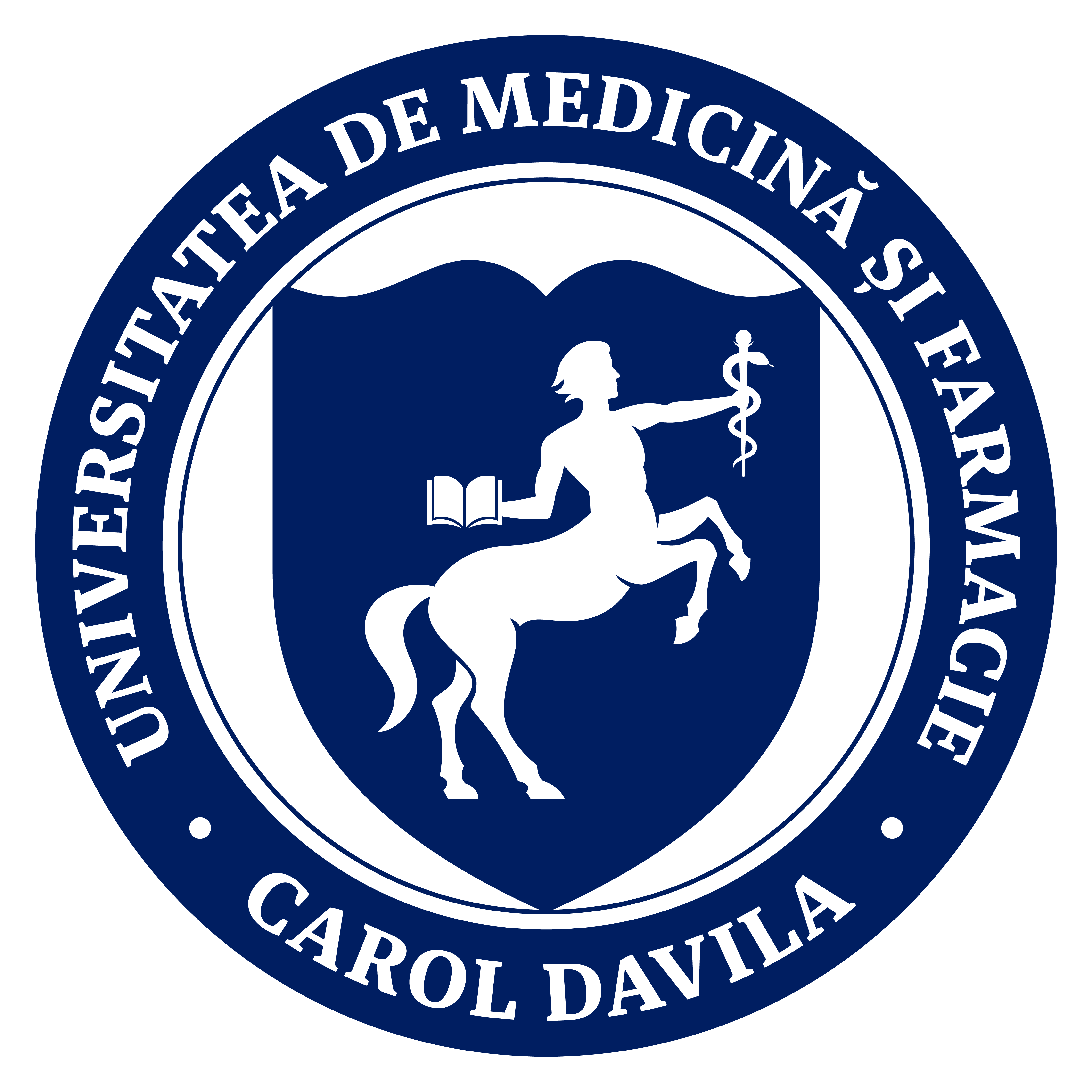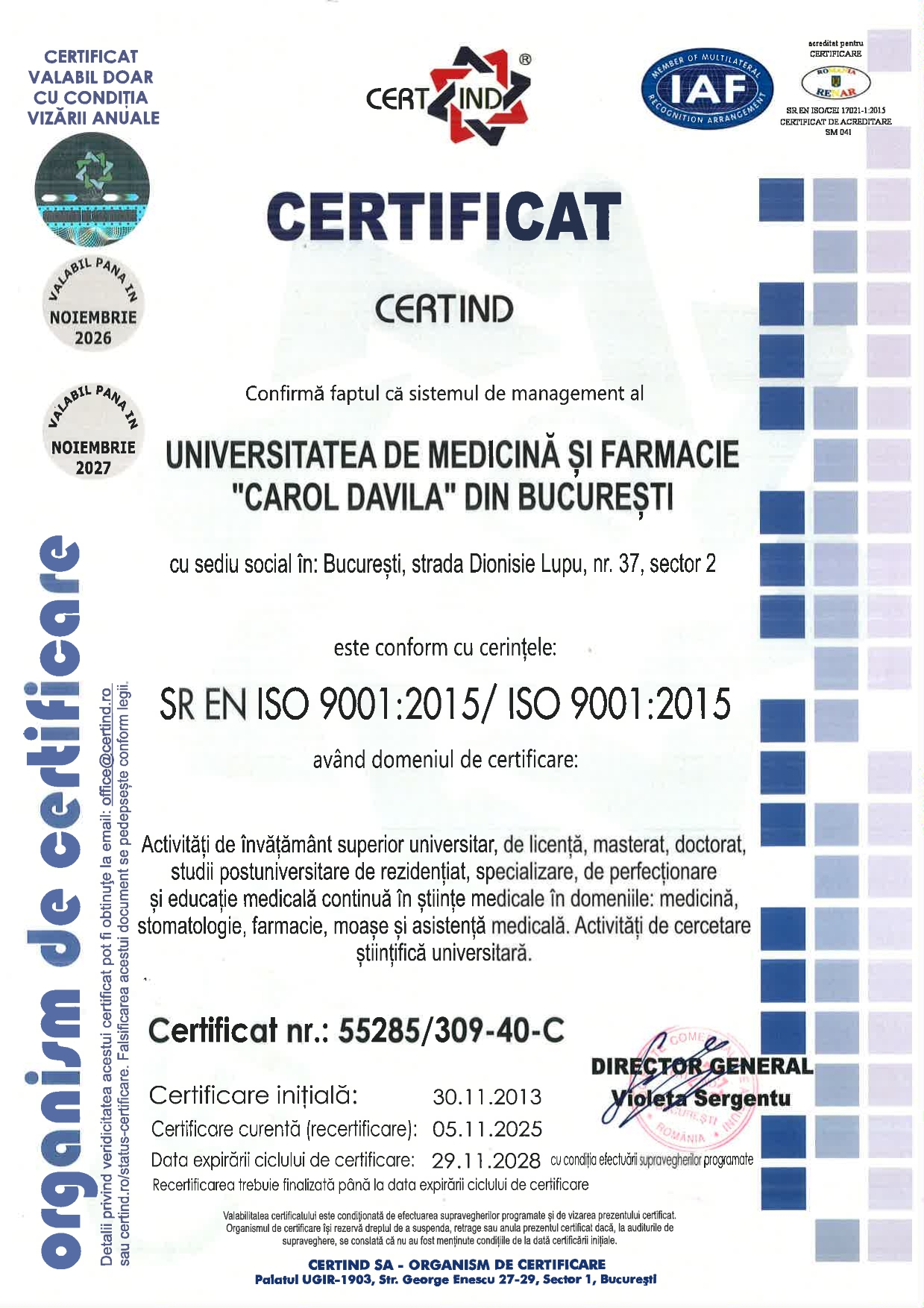[disc_cadre titlu="disc"]
- List of academic staff
- Short history of the Discipline
- Description of educational and research activities
- Useful information for students
- Useful information for residents
- Useful information regarding doctoral courses
- 10 scientific articles
[disc_cadre list="cadre"]
The Pharmaceutical Inspection Discipline was introduced for the first time into the pharmaceutical education plan in Bucharest in the year 1928, under the direction of senior lecturer, dr. Pharmacist Gheorghe Ciogolea, who maintained this position until the second World War.
Progress in the research domain, and the development of new drugs, necessitated the creation of this discipline, in the fifth decade of the twentieth century, to oversee quality control and the therapeutic efficacy of pharmaceutical preparations.
Thus, originating from the Institute of Pharmaceutical Research, founded in 1929, the Institute of Pharmaceutical Research and Inspection was established in 1954. It was further renamed in 1956, to become the Institute for State Inspection of Medications and Pharmaceutical Research, and the Institute of Chemico-Pharmaceutical Research; these two units aimed to guarantee the quality of medications.
All of these organizational measures have imposed the necessity for pharmacists to specialize into analytic pharmacists, reason for which, in 1968, the educational plan of the Faculty of Pharmacy introduced the Discipline of Pharmaceutical Inspection, under the direction of professor dr. Corneliu Baloescu. With the support of senior lecturer dr. Daniela Frățilă and lecturer dr. Maria Bârcă, he conducted sustained teaching and research activities, orienting the discipline towards the fundamental problems in methodology relating to pharmaceutical inspection.
The teaching staff focussed on modernizing the theoretical lectures and analytical methodologies applied in the practical lessons, conducted in laboratories. A remarkable accomplishment was their contribution to the elaboration of the Romanian Pharmacopeia. In collaboration with senior lecturer Daniela Frăţilă and principal researcher Maria Bârcă, professor Corneliu Baloescu participated in the redacting comissions for the 9th and 10th editions, and has contributed numerous monographs.
Currently, the discipline consists of senior lecturer dr. Maria Bârcă, lecturer dr. Anne Marie Ciobanu, lecturer dr. George Burcea, teaching assistant drd. Adina Cimpoieșu, and teaching assistant dr. Daniela Popa. In this period, the course thematics and practical lessons have been restructured, and the laboratory equipment has been upgraded to assure the best possible educational and research activities.
Pharmaceutical inspection is a specialty pharmaceutical discipline, that is essential and mandatory for the professional development of future pharmacists in the domain of drug analysis.
The goal of the Pharmaceutical Inspection course is to shape the thought process of pharmacists regarding the methodology of pharmaceutical inspection, to provide them with the necessary notions for the most appropriate training with respect to the practical and theoretical conditions in which pharmaceutical inspection actually takes place in various profilic units.
During the theoretical courses, important concepts are taught regarding:
- the pharmaceutical inspection organization in Romania (the National Agency of Medications and Medical Devices and the Inspection Laboratories of authorized manufacturers);
- norms and standards of inspection, adopted nationally and internationally;
- regulations regarding the registration of medications; the methodology of pharmaceutical analysis: sample selection, organoleptic control and preliminary analysis, general aspects about the analysis and inspection of starting materials;
- identity, purity, dosage and stability of pharmaceutical products and the methods used to analyse them;
- biological and microbial detection in pharmaceutical inspection; validity of the analytic methods applied in pharmaceutical inspection;
- quality control of pharmaceutical forms (general monographs, elaboration of quality specifications of the final pharmaceutical product, determination of the characteristic parameters for different pharmaceutical forms).
During practical lessons, students learn to apply the various methods of pharmaceutical analysis presented during the lectures, become familiar with the methods currently in place for pharmaceutical inspection, develop modern methods of analysis for the active substance in various pharmaceutical forms, learn practical applications of pharmaceutical inspections, how to present the results of their analysis and take responsibility for signing it, and how to calculate the result of the analysis and evaluate it with respect to admissible limits according to current norms.
Research activities follow several directions:
- the elaboration of physico-chemical methods for identifying and quantifying various medications, with applicability for both conventional and special pharmaceutical forms (ex. Systems transported to the target by a vector), the development of modern pharmaceutical forms and their characterization, elaboration of methods of analysis applicable to biological mediums; optimization of analytical methods for monitoring cytostatic therapy.
- contributions to the qualitative and quantitative inspection of cephalosporin antibiotics
- elaboration of new methods to detect substances of abuse
- evaluation and quality assurance of medications throughout the entire manufacturing process using modern methods of analysis (spectrometry, HPLC, HPLC-MS, GC, GC-MS)
- interdisciplinary research regarding in vitro bioavailability of medications
- in vitro testing as a quality inspection procedure and other bio-relevant methodologies for pharmaceutical forms containing ibuprofen
- development and validation of new quantification methods of isolated active substance, as well as active substance in its pharmaceutical form and in the context of biological fluids.
Didactic activities of the Pharmaceutical Inspection Discipline take the form of:
- lectures and practical lessons, for students of the Faculty of Pharmacy "Carol Davila", being described in the analytical program of 5th year, semester 1, according to which, there are 3 hours of lecture and 3 hours of practical lessons/week;
- lectures and practical lessons for students of the Pharmaceutical Technicians College "Carol Davila", are described in the analytical program of 3rd year, semester 1; for the course Chemical and Biological Analysis of Medications, the analytical program describes 2 hours of lecture and 3 hours of practical lessons/week.
- likewise, for students of the Pharmaceutical Technicians College "Carol Davila", the analytical program for 3rd year, semester 2 describes one hour of lecture and 3 hours of practical lessons/week (for a duration of 7 weeks) for the optional course: Pharmaceutical Inspection Laboratory.
Our discipline first started training residents in the year 1993, in the domains:
- General Pharmacy,
- Clinical Pharmacy,
- Pharmaceutical Laboratory,
- Pharmaceutical and Cosmetic Industry
Currently, the only domain available for training residents is the Pharmaceutical Laboratory specialty (3 modules:
- Pharmaceutical Inspection;
- Validation of analytic methods used in pharmaceutical inspection;
- Directed Laboratory Practice)
Lectures taught in these modules focus on the following aspects:
- name of the active substance,
- pharmaceutical form,
- DCI,
- concentration of the active substance, excipients;
- chemical purity;
- product safety (sterility, microbial contamination, bacterial endotoxins, pyrogenic impurity, other tests);
- the acceptable limit for impurities, according to current regulations;
- analytic methods (principles, formulas, equipment, spectroscopy, chromatograms);
- validation of analytic methods (experimental protocol, validation parameters, results, spectroscopy, reference chromatograms, interpretation of results);
- testing the stability of active substance, intermediary products and the final product, testing methods (accelerated conditions, long term), analytic testing procedures;
- quality during the proposed period before expiration;
- regulations regarding registration of medications, and rules of good laboratory practice.
Pharmacists specializing in pharmaceutical laboratory are implicated in research activities and pharmaceutical organization; they may conduct their activities in laboratories for the control and analysis of medications, in biochemical laboratories, in those for sanitary chemistry or toxicology, in medical analysis laboratories, in galenic laboratories and in production laboratories of the pharmaceutical industry.
Taking into account the rapid progress in the pharmaceutical domain and the responsibilities of specialists in this domain, the following doctoral courses are available:
- Medication Quality -20 hours (lecture) – senior lecturer dr. Maria Bârcă
- Modern methods in the quality control of medications -20 hours (lecture) – senior lecturer dr. Maria Bârcă
- Pharmaceutical forms – quality control - 40 hours (20 lecture + 20 practical lesson) – senior lecturer dr. Maria Bârcă
- Medications – GMP and GLP - 40 hours (lecture) – senior lecturer dr. Maria Bârcă
- Medications – Market Availability Authorization – 20 hours (lecture) – senior lecturer dr. Maria Bârcă
- Pharmaceutical products – inspection for impurities - 20 hours (lecture) - lecturer dr. Anne Marie Ciobanu
- Quality control of preparations used in dentistry – 20 hours (hours) - lecturer dr. George Burcea
Research activities (interdisciplinary) are consolidated through participation under national and international research contracts: research group member (15 projects), responsible member (4 projects), project head (2 projects).
The pharmaceutical inspection disciple has produced over 120 scientific articles in the period 1996-2016 (ISI rated, BDI indexed, other jourals as well as national and international scientific events).
- Barca Maria, Baconi Daniela Luiza, Ciobanu AnneMarie, Burcea George Traian Alexandru, Balalau Cristian - Comparative evaluation of methotrexate toxicity as solution for injection and liposomes following a short-term treatment in a murine model of arthritis. Note I. Haematological and biochemical evaluation. Farmacia (ISSN 0014-8237), 2013, 61(1): 220-228
- Barca Maria, Baconi Daniela Luiza, Ciobanu Anne-Marie, Militaru Manuela, Burcea George Traian Alexandru, Balalau Cristian - Comparative evaluation of methotrexate toxicity as solution for injection and liposomes following a short-term treatment in a murine model of arthritis: Note II. Histopathological changes. Farmacia (ISSN 0014-8237), 2013, 61(5): 939-947.
- Barca M, Nita S, Ciobanu AM, Banica E, Burcea G, Popa D, CimpoieAYu A, Pop A - HPLC Methods for asssay of C vitamin and flavonoids compounds from tablets -Congresul National al Farmacistilor Ed XIV, Tg Mures, oct 2010
- George Traian Alexandru Burcea Dragomiroiu, Octav Ginghina, Flavian Stefan Radulescu, Dumitru Lupuleasa, Maria Barca, Daniela Elena Popa, Carolina Negrei, Dalia Simona Miron - In vitro screening of alcohol-induced dose dumping phenomena for controlled release tramadol tablets. Farmacia (ISSN: 0014-8237), 2015, Vol. 63(5), pg 670-676
- George Traian Alexandru Burcea Dragomiroiu, Adina CimpoieAYu, Octav Ginghina, Corneliu Baloescu, Maria Barca, Daniela Elena Popa, AnneMarie Ciobanu, Valentina AnuALa – The development and validation of a rapid hplc method for determination of piroxicam. Farmacia (ISSN: 0014-8237), 2015, Vol. 63(1), pg 123-131.
- George Traian Alexandru Burcea Dragomiroiu, Octav Ginghina, Dalia Simona Miron, Maria Barca, Daniela Elena Popa, Mircea Hirjau, Dumitru Lupuleasa, Flavian Stefan Radulescu – The influence of splitting on the in vitro release of metoprolol succinate from scored tablets. Farmacia (ISSN: 0014-8237, lista A), 2015, Vol. 63(2), pg 280-285.
- Anne-Marie Ciobanu, Ionela Neagoe, Daniela Baconi, Maria Barca, Dan Balalau, Andra Rodica Balanescu, Gina Manda - Particular inhibitory action of low concentrations of methadone on peripheral T lymphocytes - Farmacia (ISSN 0014-8237, ISI), 2011, 59 (5): 603-610
- Ciobanu A.M., Baconi D., Barca M., Nicola C., Balalau D. - Screening methods for methadone identification, Medicine in Evolution (ISSN 2065-376X, BDI), 2012, XVIII(1): 75-79
- Anne-Marie Ciobanu, Daniela Baconi, Maria Barca, Claudia GuALu, D. Balalau - Semi-quantitative determination of methadone by TLC- Revista Medico-Chirurgicala a Societatii de Medici si Naturalisti din Iasi, (ISSN 0300-8730), 2011, 115 (3): 961-964
- Popa Daniela Elena, Lupuleasa Dumitru, Stanescu Ana-Andreea, Barca Monica, Burcea-Dragomiroiu George Traian Alexandru, Miron Dalia Simona, Radulescu Flavian E~tefan – Simulation of the in-vivo exposure to ibuprofen based on in-vitro dissolution profiles from solid dosage forms. Farmacia (ISSN: 0014-8237, lista A), 2014, Vol. 62(3), pg 483-493.



